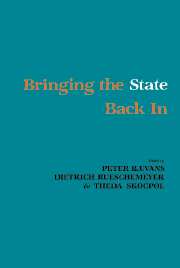Book contents
- Frontmatter
- Contents
- Preface
- Introduction
- Part I States as Promoters of Economic Development and Social Redistribution
- Part II States and Transnational Relations
- 5 War Making and State Making as Organized Crime
- 6 Transnational Linkages and the Economic Role of the State: An Analysis of Developing and Industrialized Nations in the Post–World War II Period
- 7 Small Nations in an Open International Economy: The Converging Balance of State and Society in Switzerland and Austria
- Part III States and the Patterning of Social Conflicts
- Conclusion
- Notes on the Contributors
- Index
7 - Small Nations in an Open International Economy: The Converging Balance of State and Society in Switzerland and Austria
Published online by Cambridge University Press: 29 January 2010
- Frontmatter
- Contents
- Preface
- Introduction
- Part I States as Promoters of Economic Development and Social Redistribution
- Part II States and Transnational Relations
- 5 War Making and State Making as Organized Crime
- 6 Transnational Linkages and the Economic Role of the State: An Analysis of Developing and Industrialized Nations in the Post–World War II Period
- 7 Small Nations in an Open International Economy: The Converging Balance of State and Society in Switzerland and Austria
- Part III States and the Patterning of Social Conflicts
- Conclusion
- Notes on the Contributors
- Index
Summary
Vulnerability in relation to the international economy is an inescapable fact of life for all of the small countries of Europe. Having chosen economic strategies that depend on international openness, they cannot shift the cost of economic change abroad. Because of the limitations imposed by the scale of their domestic economies, they cannot preempt change through ambitious attempts at industrial reorganization. None of this, however, has prevented them from developing political strategies for achieving national goals. The small European states have compensated for economic openness and dependence on world markets through political efforts at home, and by most indicators they have done so effectively. They have developed a variety of corporatist arrangements that combine support for international openness with domestic compensation and with flexible, reactive policies of industrial adjustment.
The strategies they have adopted, the state capacities they have developed, and the ways they have linked the state to other social actors all set the small European democracies apart from larger industrial countries. At the same time, however, these countries exhibit very different patterns of state structure and action among themselves. Nowhere is the combination of commonality and divergence more striking than in the Alps.
Because they seem to be so close together and yet so far apart, Austria and Switzerland offer an interesting subject for a comparative essay on the state. Austria exemplifies democratic socialism, Switzerland liberal capitalism. The strongest political force in Austria is the labor movement, in Switzerland the business community. The Swiss state enjoys restricted power in society, the Austrian state far-reaching ones.
- Type
- Chapter
- Information
- Bringing the State Back In , pp. 227 - 252Publisher: Cambridge University PressPrint publication year: 1985
- 11
- Cited by



